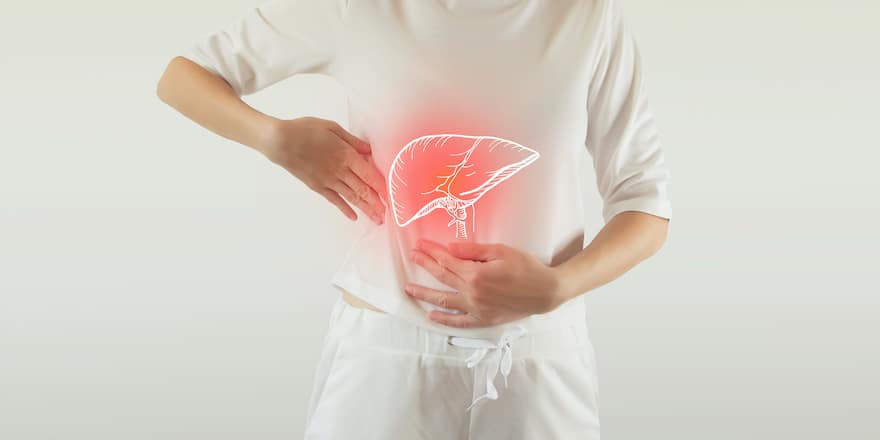Le foie est l’organe le plus volumineux de notre organisme avec un poids d’environ 1,5 kg et 10 cm de diamètre, et il possède un rôle clé dans le fonctionnement du corps :
- il filtre et détoxifie le sang : en le filtrant, il le débarrasse de ses déchets et toxines
- il transforme et stocke des substances apportées durant la digestion
- Il synthétise la bile, et est impliqué dans le métabolisme des glucides, lipides et protéines
Comme le reste de notre corps, il peut être atteint par des pathologies aiguës ou chroniques.
Among the most common diseases are chronic hepatitis (B and C), non-alcoholic fatty liver disease (NASH), alcoholic hepatitis, hemochromatosis, and liver cancer.
La majorité ont pour conséquence le développement d’une fibrose puis d’une cirrhose.
However, if you think of the “liver crisis”, its name is misleading: it refers to a digestive problem, not a liver dysfunction!
Je vous indique ici 7 signes qui peuvent vous alerter. Si vous avez un doute concernant la santé de votre foie, consultez un professionnel de santé qui saura vous donner un diagnostic avisé.
Read also | The best dietary supplements for a healthy liver
1. A yellow complexion
Le teint jaune, que l’on nomme jaunisse ou ictère, est souvent associé à un problème hépatique.
Vous avez les yeux ou la peau jaunes ? Cette coloration provient d’une accumulation de bilirubine, un pigment de la pile. Lorsque le foie est malade, il peine à éliminer cette bile.
Néanmoins, attention ! Vous pouvez avoir un ictère et un foie en bonne santé. En effet, la présence de calculs biliaires peut aussi déclencher la jaunisse.
2. Des douleurs abdominales
Abdominal pain can be a sign of indigestion or of a more serious condition. It can, in particular, occur when your liver is unwell.
Are you experiencing pain on the right side of your abdomen, under the ribs, as well as in the shoulder and back? It could be a sign of a liver problem.
Some conditions cause intense, sudden and persistent pain, which can be hard to bear and may lead to a trip to the emergency room.
3. Des problèmes de digestion
Des nausées, douleurs gastriques, des diarrhées fréquentes ? S’ils peuvent indiquer une grossesse ou une indigestion, ces symptômes pourraient bien indiquer que vous souffrez d’une pathologie hépatique.
Indeed, the liver plays a role in digestion through its production of bile. If its function is impaired, digestion may be less effective and cause discomfort.
4. Un ventre gonflé

Ne vous inquiétez pas, des ballonnements et des gazs ne sont pas forcément synonymes de pathologie hépatique. Néanmoins, si cela est persistent, soyez vigilant.
Indeed, a severe liver dysfunction can lead to the accumulation of a pale yellow fluid in the tissues (ascites), resulting in abdominal distension and a feeling of heaviness. It is often seen in cirrhosis.
5. Pale stools and dark urine
Do you constantly have pale to white stools? This can be a sign of liver failure.
Ce symptôme est la conséquence d’une réduction, voire d’une absence, de sels biliaires dans les intestins. Même si aborder ce sujet peut être gênant, notifiez-le à votre médecin traitant.
Indeed, it is normally bilirubin transformed into stercobilin that causes this dark color of stools.
To eliminate bile salts, our body can make the kidneys work by eliminating them in the urine.
Cela provoque une couleur foncée de ces dernières.
Attention, certaines pathologies hépatiques peuvent entraîner des hémorragies qui donnent, au contraire, des selles noires à cause de la présence de sang.
6. Une fatigue générale
If you work too much or partied late into the night, fatigue is perfectly normal. But long-term general fatigue is a symptom common to many conditions, including liver disease.
L’accumulation de toxines, les perturbations métaboliques des glucides, lipides et protéines peuvent être responsables de cette asthénie.
De plus, un foie malade a tendance à entraîner des troubles du sommeil avec une difficulté d’endormissement et des réveils nocturnes.
7. Un amaigrissement inexpliqué
Vous perdez l’appétit et du poids sans aucune explication logique ? Ils peuvent être le signe d’un foie malade.
However, this symptom usually indicates a cirrhotic stage of liver disease, which must be addressed very quickly. Contact your doctor without delay!
Read also | 20 foods to protect our liver



